TWTW: The World This Week #101
Unleashed Sports: Viewing Olympics, from every angle…An Unleashed first…Elections in America & Venezuela…Netanyahu's in town…shivering in Brussels and Beijing…Italian cartoonist Marco on Olympic angst
In this weekly feature for Andelman Unleashed, we continue to explore how the media of other nations are reporting and commenting on the United States, and how they are viewing the rest of the world.
Today, from Paris and the just-launched Games of the XXXIII Olympiad!
Unleashed Sports
How everyone sees the Olympics
A spectacular opening ceremony for the Olympic games with 325,000 spectators (plus 200,000 more hanging out of their windows along the route) scattered along the 6 kilometers (4 miles) of the Seine spooling through Paris. For 4½ hours France held the world in its spell. Or as the great Paris tabloid Le Parisien exclaimed:
“Breathtaking”
Incidentally, at the bottom: an ad for the French utility EDF, which supplies electricity to much of France, and the extraordinary Olympic electric flame beneath a balloon that will be anchored at the western edge of the Tuileries throughout the games. 10,000 people a day—by lottery—will be able to visit it up close & personal. Andelman Unleashed won a spot and will be visiting…and reporting.
Since every news organization around the world was here to chronicle this extraordinary spectacle, we will not duplicate these efforts:
BBC: "brilliantly frenetic spectacle with a distinctive style ".
The Guardian: “it was all about determination in the face of adversity."
Financial Times: The rain forced "the organisers to scale back parts" of the show.
Frankfurter Allgemeine Zeitung: "One thing is certain: this spectacle will remain in history."
El País : "Paris amazed the world under the deluge" .
La Repubblica: "parade of self-celebration"
La Stampa: "a flop, a hole in the water", [except for] a "moving finale".
Rzeczpospolita "the French made the impossible possible" with a "breathtaking spectacle.”
Jiji [Japan]: "bold ideas that no one else would have thought of, which were sometimes criticized, but which were brilliantly executed.”
The Indian Express: "It was a rare evening where the French didn't mind laughing at their expense, playing on stereotypes.”
Pravda: "slipped into racism and neo-Nazism" because of conditions imposed on Russian athletes due to the "special military operation" in Ukraine.
Le Temps: "if the rain played spoilsport, to the point that some spectators quickly left their seats, it did not manage to spoil a moment that the organizers announced would be grandiose.”
For Parisians, including Andelman Unleashed, it all still posed some extraordinary challenges….
First was movement….vast stretches of Paris were effectively shut down for the opening ceremonies. All in the name of security. Paris police chief Laurent Nuñez said he was "calm and focused" ahead of the opening ceremony, as Le Parisien reported:
"We are very calm. We are not stressed, we are very focused, we continue to do our job. Right now, we are really on the final adjustments…
But, Mr. Nuñez warned, "we need identification criteria, otherwise we will explode. We have to control this route. We cannot be overwhelmed." Since July 15, on several axes in the Paris region, including the ring road, 185 kilometers of lanes have been reserved for the Olympic Games and for people accredited by the organizing committee.
Which hardly prevented the first likely terrorist incident, still of unknown origins, as Le Monde reported:
During the night from Thursday to Friday, fiber optic cables running near the tracks and ensuring the transmission of safety information for drivers (red lights, points, etc.) were cut and set on fire at various locations on the TGV [high-speed train] network….“by an organized gang" and "criminal association"….
The attack occurred just hours before the opening ceremony of the 2024 Olympic Games in Paris, when many travelers had planned to travel to the capital, causing massive chaos in train stations early Friday morning. "The people who are most affected today are the 800,000 travelers expected this weekend who have to reach their vacation spots. It is rather the great coming and going on vacations that is targeted more than the Olympic Games specifically," said the outgoing Minister Delegate for Transport, Patrice Vergriete,
Some 45,000 police and paramilitary gendarmes plus 10,000 soldiers were hauled in for the opening day festivities, often from far outside of Paris, many with no clue where the most basic landmarks were situated.
So, this all came at a price, quite a price for anyone who had to live in Paris for the days or weeks leading up this momentous event, even for the air quality of the City of Lights as I detailed for SubStack’s Callaway’s Climate Insights….
When the government “decided to welcome the Olympic Games, we just did it and we don't really question about the impact on air pollution,” said Tony Rennuci, executive director of Respire, which has been monitoring air quality in France for decades and has been carefully documenting the entire lead-up to the competitions.
There were simply too many other threats — terrorism at the top of the list. So when the gendarmerie closed all central Paris bridges across the Seine and shoveled all traffic down to the Pont de Sully, pollution of stalled traffic was pretty far down on the agenda.
We released an online map about pollution across the different outdoor Olympic stadiums or spot infrastructures, and we could see that almost all of them were very far above the guidelines when it comes to air pollution. We also saw that the most polluted ones were the closest to the Peripherique.
And then there’s the transport…some of which may have been less than fully thought out:
Between 11:15 pm and the end of service hours (the last métro stops running at 2:15 am on a normal Friday), further stations will close to prevent any overcrowding of opening ceremony spectators rushing to use public transport…. This will be the case at the École Militaire and La Tour-Maubourg stations on line 8, Rue du Bac and Solférino on line 12…
Instead, the hordes of spectators—all peaceful, well-mannered, joyful—had to walk to the next metro, or the next….
photo: David A. Andelman
Incidentally, our Oura ring recorded that we’d walked 6.8 kms (4.2 miles) Friday evening. And we never did reach our $3,500 worth of seats on the right bank. Although thousands of others were turned away as well, it seems that the Ministry of transports had made one promise:
Then, without notice, suddenly and inexplicably reneged. At 4 pm, the Invalides bridge was already barred by the police. Unable to cross the Seine, we watched the whole ceremony on big screens just off the quai in front of the French Ministry of Foreign Affairs…til the rain drove us home.
Saturday, one of the Olympic bicycle races—the thrilling “course contre la montre” (one person time trial)—tore right past our flat, down the Boulevard St Germain and back around to the Invalides. Two Belgians on the podium, the gold going to Remco Evenepoel, crossing the finish line at the Pont Alexander III bridge with a 15 second lead, as Cycling News put it “stamping his authority on the race of truth.”
Video by David A. Andelman
With more, much more, this week.
An Unleashed First !
Andelman Unleashed has just, well, unleashed new, paid tiers.
And this Friday, for our (lightly) paid subscribers, we’ll be offering our first Unleashed Conversation via Zoom….this time from Paris….one hour at :
6 pm Paris, Western Europe, Africa
Noon New York, eastern Canada, and Latin America
9 am in San Francisco
9:30 pm in New Delhi
midnight in Hong Kong and Beijing
So DO sign up…you’ll get a link…and we’ll have fun!
To avail yourself: $6 a month / $60 a year (2 months free!) / Founding Member: $200 with lots more perks!
Elections 2024: America, Venezuela
Everyone's watching…and now, it’s Kamala
The world is on edge, though perhaps less so this week than last. Still, skeptics abound across the globe, as reflected by London’s Financial Times which posed the ultimate question, with a still somewhat unsettling response:
A week is a long time in politics, and this has been a good one for Kamala Harris and the Democrats. The sense of impending doom that had surrounded the party for months has evaporated, there is renewed energy in the base and Donald Trump and his outriders appear rattled. And it’s not just vibes: the turnaround shows up in hard data….
Notably, Harris’s boost is not coming from previously decided voters switching their allegiance but from winning over previously undecided and third-party voters, particularly the young, Black, and Latino electorates that Biden had been struggling to persuade…But these figures paint an overly rosy picture. Biden’s polling has been dire….We should be comparing her not with the Biden of July 2024 but the Biden of the early days of November 2020. By that yardstick, Harris comes up well short. The vice-president’s approval rating advantage over Trump is currently about four points; on the eve of the 2020 election Biden’s was more than 15….
The good news for Democrats is several winds are blowing in her favour….Voters don’t blame Harris for inflation and a bad economy as they did Biden….Harris [also] has a big lead over Trump on abortion….Another tailwind comes from the pool of “double-haters” who dislike both Biden and Trump….Immigration is probably Harris’s biggest vulnerability….Gaza-Israel is another potential vulnerability, but polls suggest there is less downside here than one might expect….
Harris is a much stronger candidate than Biden was, but in an election held today, she would still lose. To win in November she must walk the tightrope to win over the remaining undecideds without alienating others along the way
V-day in Caracas
Will Sunday’s intensely watched elections be more of Chavismo [re-election of President Nicolas Maduro] or a stunning reversal, putting what for millions would be a welcome end to years of chaos as Venezuelans vote for their president? Polls opened on time Sunday morning across the nation … we will follow the results as closely as ever.
As Lucas Reynoso reported for El Pais from next door in Bogota where millions of Venezuelans have taken refuge from Chavismo—named for Maduro’s like-minded predecessor Hugo Chavez—there are rays of optimism:
The movement behind the united [opposition] candidacy of Edmundo González Urrutia and María Corina Machado hopes as much for July 28, the day that could mark an end to 25 years of Chavista governments.
In addition to its control over the National Electoral Council [CNE], Chavismo has undertaken all kinds of measures to discourage electoral participation and has threatened to revoke government benefits if citizens don’t vote for its candidates. However, experts consulted by EL PAÍS say that the country’s technological voting system may be a great ally in avoiding fraud. Each machine prints out certificates before sending its results to the CNE. This paper trail may be the key to determining the real winner….
Opposition forces have already cleared several significant hurdles on the road to election day. Polls show that support for Machado, who won the opposition’s primaries in October but was disqualified from running in January, has been successfully transferred to Urrutia, a diplomat who was nearly unknown until a few months ago. Now, the challenge lies in generating massive voter turnout on Sunday in a country where voting is optional….
Only 69,000 people have been cleared to vote abroad….The Venezuelan diaspora is currently composed of 7.5 million people, of whom 5 million are of voting age. More than 4 million have been displaced to Colombia and Peru in recent years, but the countries are home to only 7,000 and 600 registered Venezuelan voters, respectively…. Chavismo is well aware that those who have left the country are critical of its administration.
Still] manipulation through institutional control only works when the difference between the two candidates is not very wide [opinion polls are pointing to a nearly 25-point gap].
How others see America
A foreign visitor
Israeli Prime Minister Benjamin Netanyahu paid a special visit—long-anticipated, if hardly welcomed in many circles—highlighted by what some foreign observers, especially in Washington, likened to an (American) Presidential address.
Back home, the Israeli daily Haaretz had a very special ‘yesterday, today, and tomorrow,’ take on his would-be victory lap in Washington:
If Benzion Netanyahu had his way and, instead of being forced by his wife Cila to return to Jerusalem in late 1948, he had kept his family in New York, Benjamin Netanyahu would have been born there. Perhaps he would have gone into politics and become the first Jewish president of the United States. On Wednesday evening, we had a glimpse of that parallel universe.
Netanyahu's address to the joint meeting of Congress was a studied imitation of a presidential State of the Union, complete with the recognition of distinguished guests in the gallery at the start and the "God bless the United States of America" at the end.Netanyahu & pals
But Netanyahu was not born in the U.S. He is the prime minister of Israel, and nowhere in the 52 minutes of his record-breaking fourth address (yes, he made sure to mention right at the very beginning how many times he had been given this honor) was there any detail, not even the slightest hint, of how he plans to extricate Israel from the tragic impasse in which it's trapped, and on his watch.
Netanyahu may have won 52 standing ovations from the rapturous, majority-Republican audience, but his rhetoric that so impressed the natives in Washington offered nothing for Israelis watching back at home.
Then it was on to meet Kamala, as London’s Guardian reported:
An unnamed Israeli official accused Harris of endangering a potential deal to free Israeli and dual-national hostages in Gaza. “Hopefully the remarks Harris made in her press conference won’t be interpreted by Hamas as daylight between the US and Israel, thereby making a deal harder to secure,” the Israeli media reported the official as saying.
Israel’s far-right national security minister, Itamar Ben-Gvir, who this week endorsed Donald Trump’s candidacy, immediately joined the fray, tweeting: “There will be no truce, Madam Candidate.”
Indeed, the pro-Netanyahu Times of Israel headlined:
Finally to Mar-la-Go where after an embracing meeting with Donald Trump, The Times of Israel reported Trump warned of …
“Major wars in the Middle East and maybe a third world war” if he didn’t win the election.
How others see the World
Musical chairs in Brussels and beyond
OK, so we know that Ursula von der Leyen will continue as leader of the European Union. What about her effective cabinet—her ‘commissioners’…ah well that’s a whole different kettle of fish. No one’s job is safe, as EurActiv reported:
As European Commission President-elect Ursula von der Leyen prepares to spend the summer interviewing potential candidates for her new team, she may face challenges on three key fronts….
Any consideration of personalities on the drawing board on Berlaymont’s 13th floor will have to take into account gender parity, political party affiliation, and the balance between geography and priorities.
While this widely worked when von der Leyen compiled her first team in 2019, this time around, she might be looking at a tough summer to get all her ducks in a row.
Meanwhile, Politico Europe had its own take on a few folks, not to mention countries who want a top person in the heart of her cabinet:
Now that she’s cemented her second term as Commission president, it’s up to her to dole out leadership assignments within the EU executive to nominees from the capitals.
Who’s most anxious? Politico Europe singles out Greece, Poland, Netherlands, Lithuania, even Malta. Moreover:
With French President Emmanuel Macron and German Chancellor Olaf Scholz in weakened positions, and bridge-builders such as former Dutch Prime Minister Mark Rutte and Belgian Prime Minister Alexander De Croo leaving the Council, [Greece’s] Mitsotakis can style himself as a leader of leaders.
Still, Macron’s riding the crest of a world-class debut of the Olympics, playing host to at least 80 heads of state or government at the Élysée Palace for a “grand reception” before escorting all of them to the presidential reviewing stand for the opening ceremonies. As French news network BFM reported:
Macron orchestrated a vast diplomatic ballet Friday…
Especially a select few he singled out for special one-on-one treatment, most notably Argentina’s off-the-leash new president Javier Milei…
After all, though Macron has lost his majority in the National Assembly, not to mention much of his control over a new government—he’s said he won’t name a prime minister until after the Olympics—he still has all but absolute control over French foreign and defense policy. Clearly, he’s prepared to play all this to the hilt.
At the same time, some may find a less warm welcome. As Africa Intelligence reported:
Expected in France for the opening ceremony of the Olympic Games, Rodolphe Héritier Doneng [Minister of Youth & Sports for the Central African Republic] is accused, in a complaint transmitted in mid-July to the public prosecutor, of leading a militia close to the presidential camp. He is suspected of death threats and an assassination attempt on French soil.
Indeed, Africa Intelligence also suggests all those coups in Africa—seven in the last three years—that have brought to power juntas that are hardly the democratic choice of their people, have complicated matters:
The composition of the delegations of countries led by juntas to the Paris 2024 Olympic Games was the subject of tight arbitrations between the IOC and the Quai d'Orsay [French foreign ministry].
Indeed, UN Secretary General Antonio Gutteres was in Paris and doing his own bit of work in dealing with a host of global crises, as TRT Afrika reported:
Guterres urged countries around the world to stop armed conflict as part of the Olympic truce…
"I want to express the total support of the United Nations to the IOC," Guterres said. "We live in a divided world where conflicts are proliferating in a dramatic way. The horrendous suffering in Gaza, the seemingly endless war in Ukraine, terrible suffering from Sudan to the DRC (Democratic Republic of Congo), from the Sahel to Myanmar. In a moment like this it is important to say that the first recorded, in history, real peace was the Olympic truce."
During the Olympics in ancient Greece all conflicts ceased for the duration of the Games to allow for the competitions to go ahead.
This includes a Palestinian team, which while not a full member of the United Nations, has an official national Olympic Committee, as well as athletes from Russia and Belarus, who are competing as neutrals without a flag or emblem following the invasion of Ukraine in 2022.
Worries in Beijing
China has quite enough to worry about at the moment—juggling commitments to Russia, its own stagnating economy. Now Beijing is beginning to reflect about life-after-Biden. As Hong Kong’s South China Morning Post, increasingly reflective of thinking by the Chinese leadership, observed in a report by Kawala Xie:
Harris is considered to be tough on issues such as human rights in Hong Kong and Xinjiang, as well as Washington’s Indo-Pacific strategy. She has stepped up contacts with US partners in the region and pledged US commitment to help counter China’s military activities in the disputed South China Sea.
She met Taiwanese leader William Lai Ching-te at the inauguration of Honduran President Xiomara Castro in 2022 and has not flinched over continued US support for the island, while also being vocal in her support for the US Chips and Science Act to compete with China’s semiconductor industry.
To boost her chances during a heated election campaign, Harris could propose tougher policies on China, including higher tariffs on Chinese products, similar to what former president Donald Trump imposed
Finally, there’s …. Marco de Angelis
The great Italian cartoonist Marco de Angelis imagines five of the world’s horrific crises today contained within the iconic five Olympic rings…clockwise from top left—Russia’s war in Ukraine, the holocaust in Gaza, refugee camps, the refugees on the road desperate to escape them, and the fate all too many meet in the fraught crossing of a savage Mediterranean.
Marco de Angelis, is an Italian cartoonist, born in Rome in 1955 and has published in 200 newspapers in Italy and abroad since 1975. For many years a journalist and cartoonist for the dailies La Repubblica, Il Popolo and Il Messaggero, he is editor-in-chief of the online magazine Buduàr. He received the Palme d'Or in Bordighera in 1997, two first prizes from the Council of Europe in 1978 and 1990, the first prize in Istanbul in 1987 and 2016, and some 130 other awards. He is a member of the global Paris-based collective Cartooning for Peace.
Here’s how Marco de Angelis imagines himself:




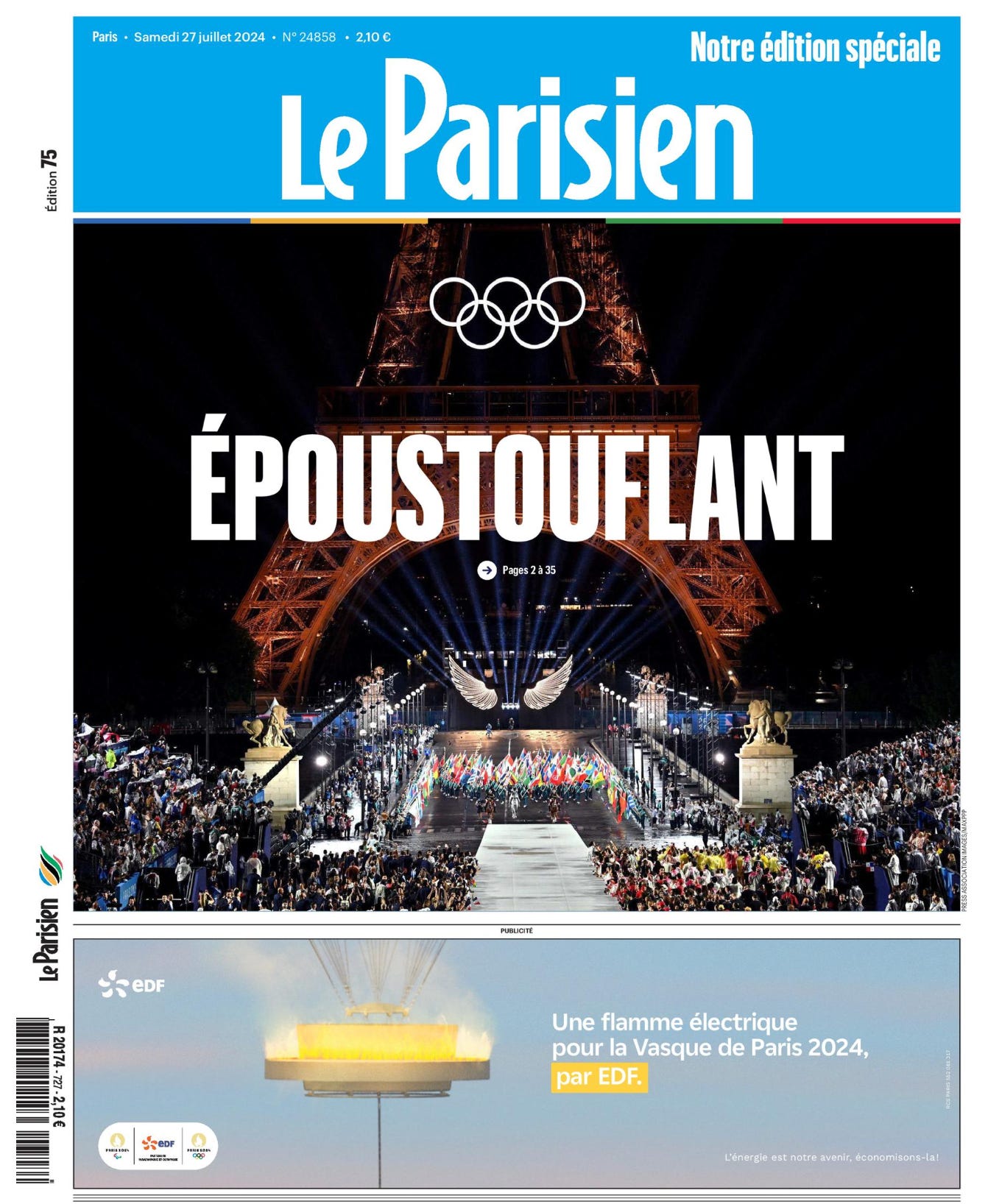
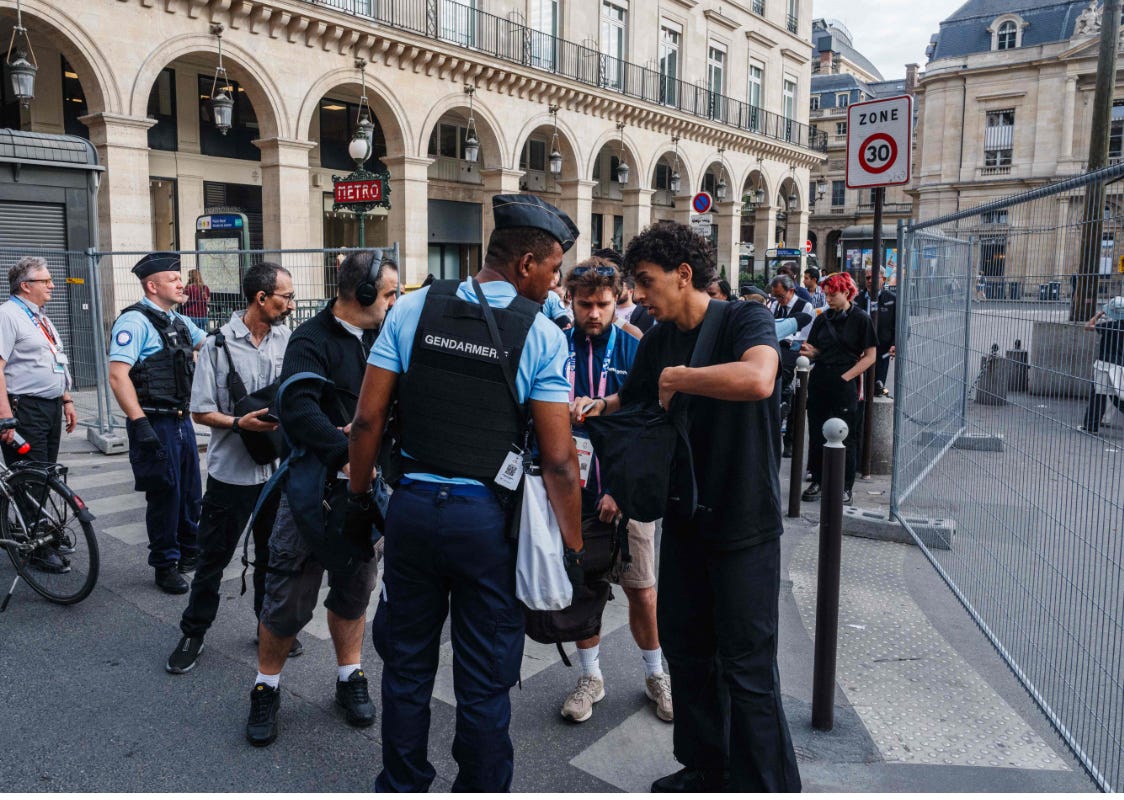
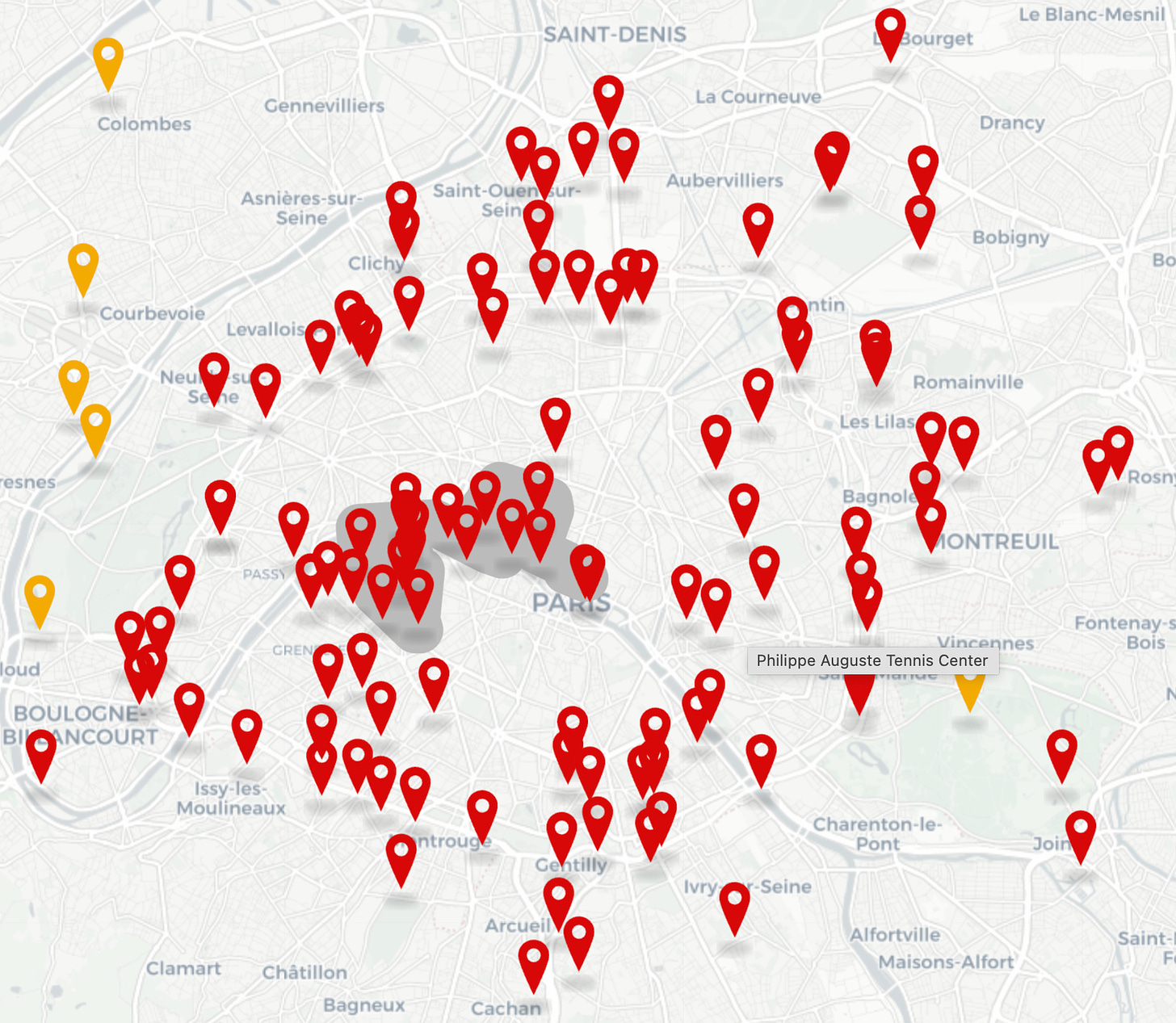

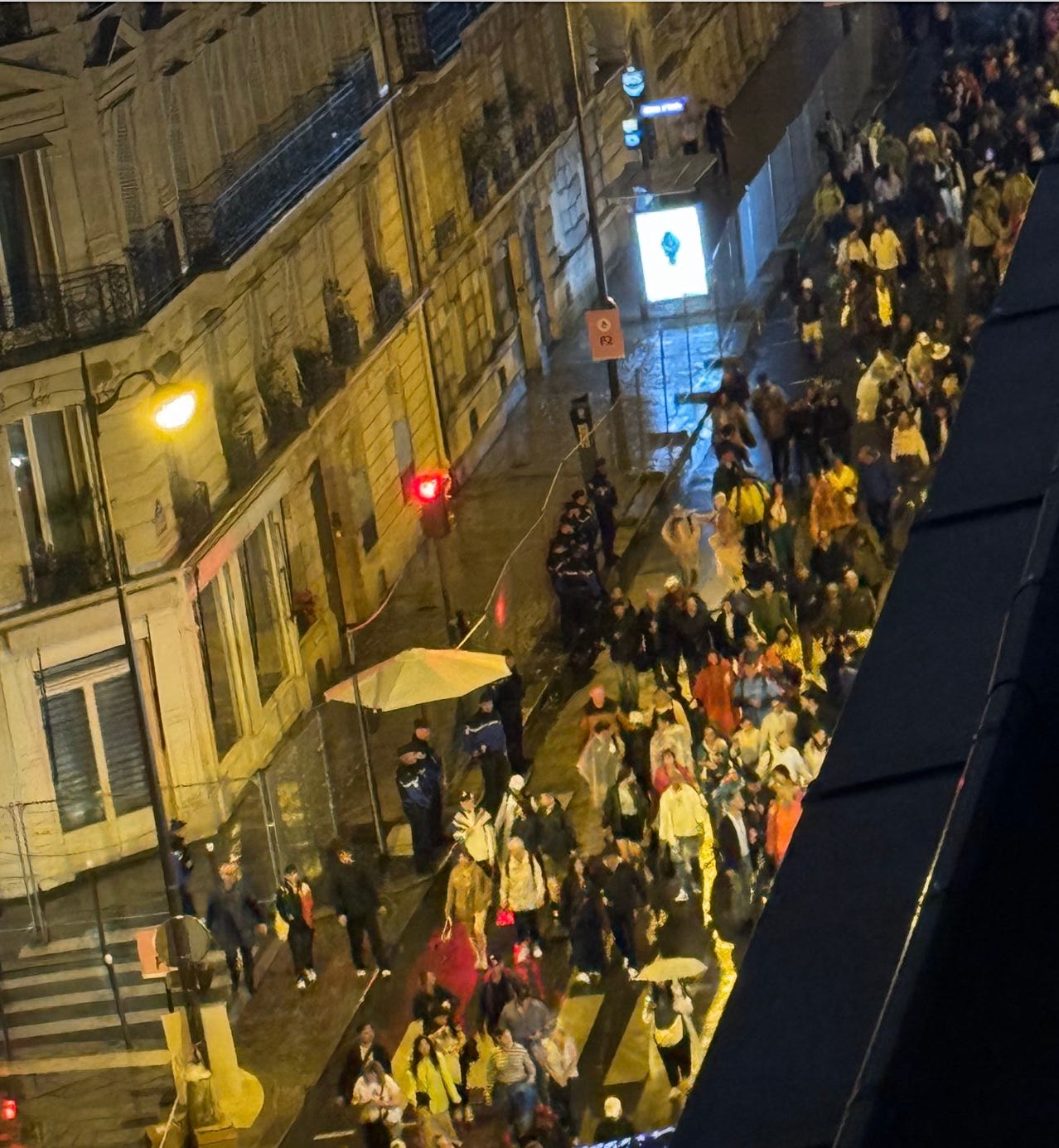
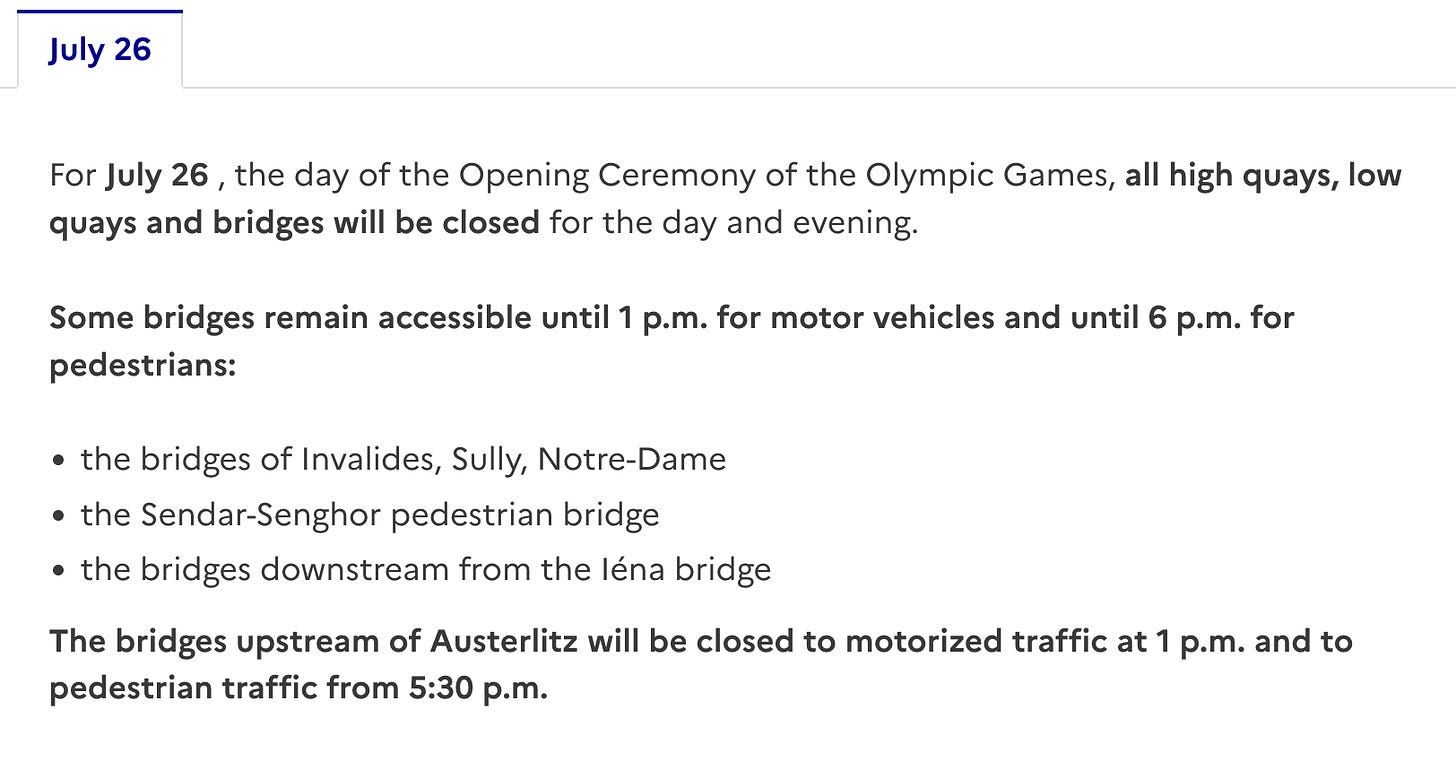

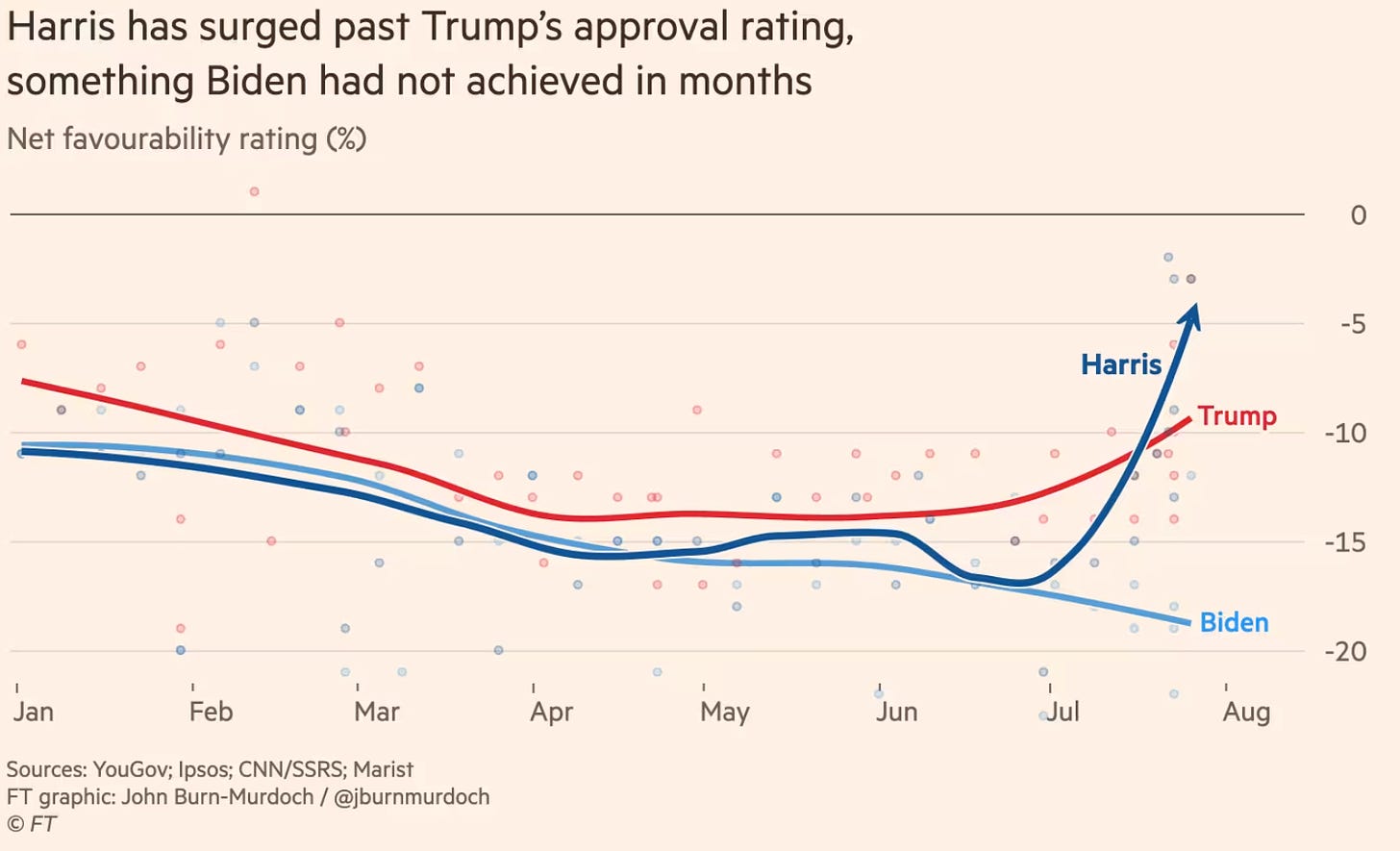
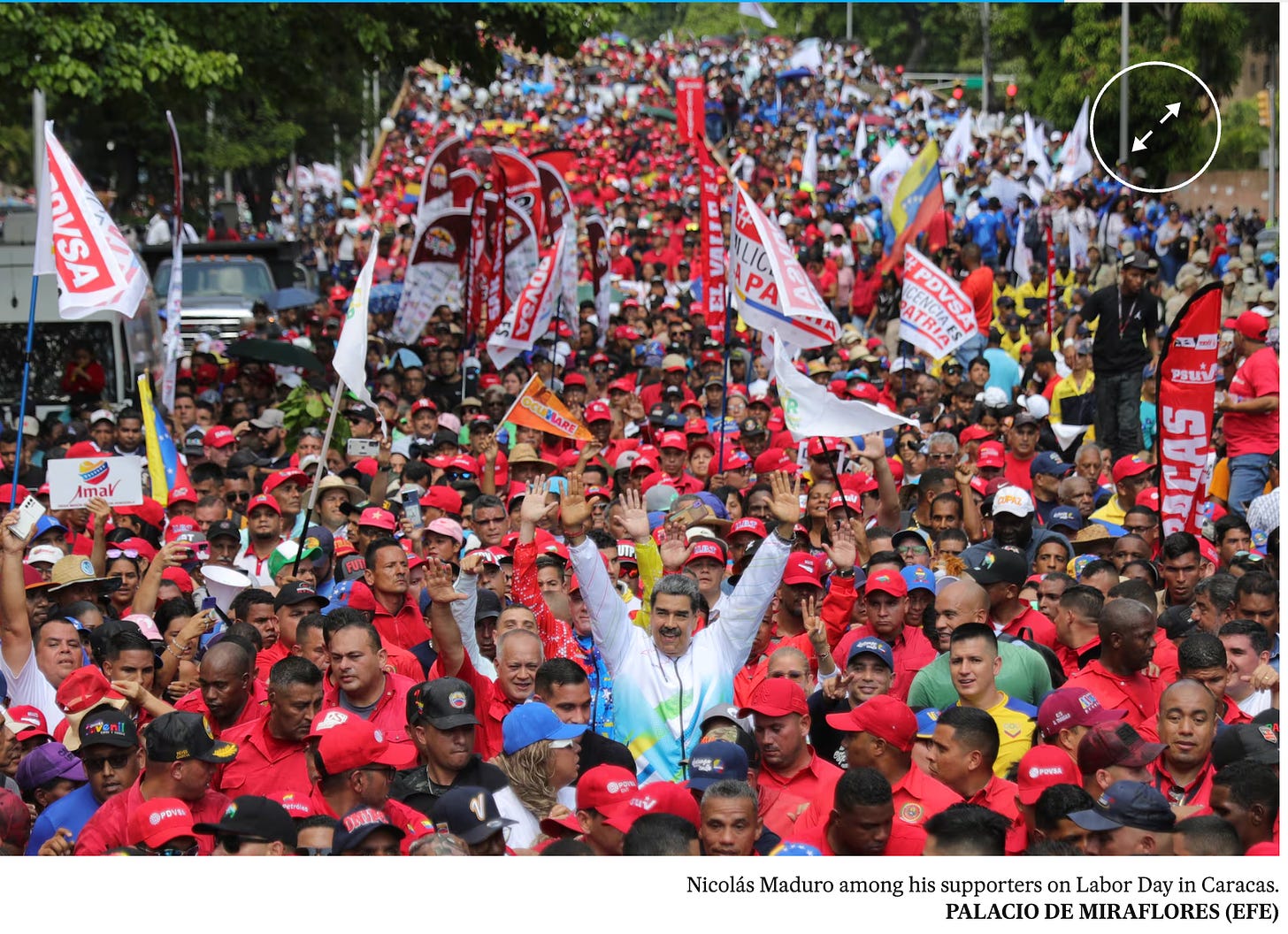
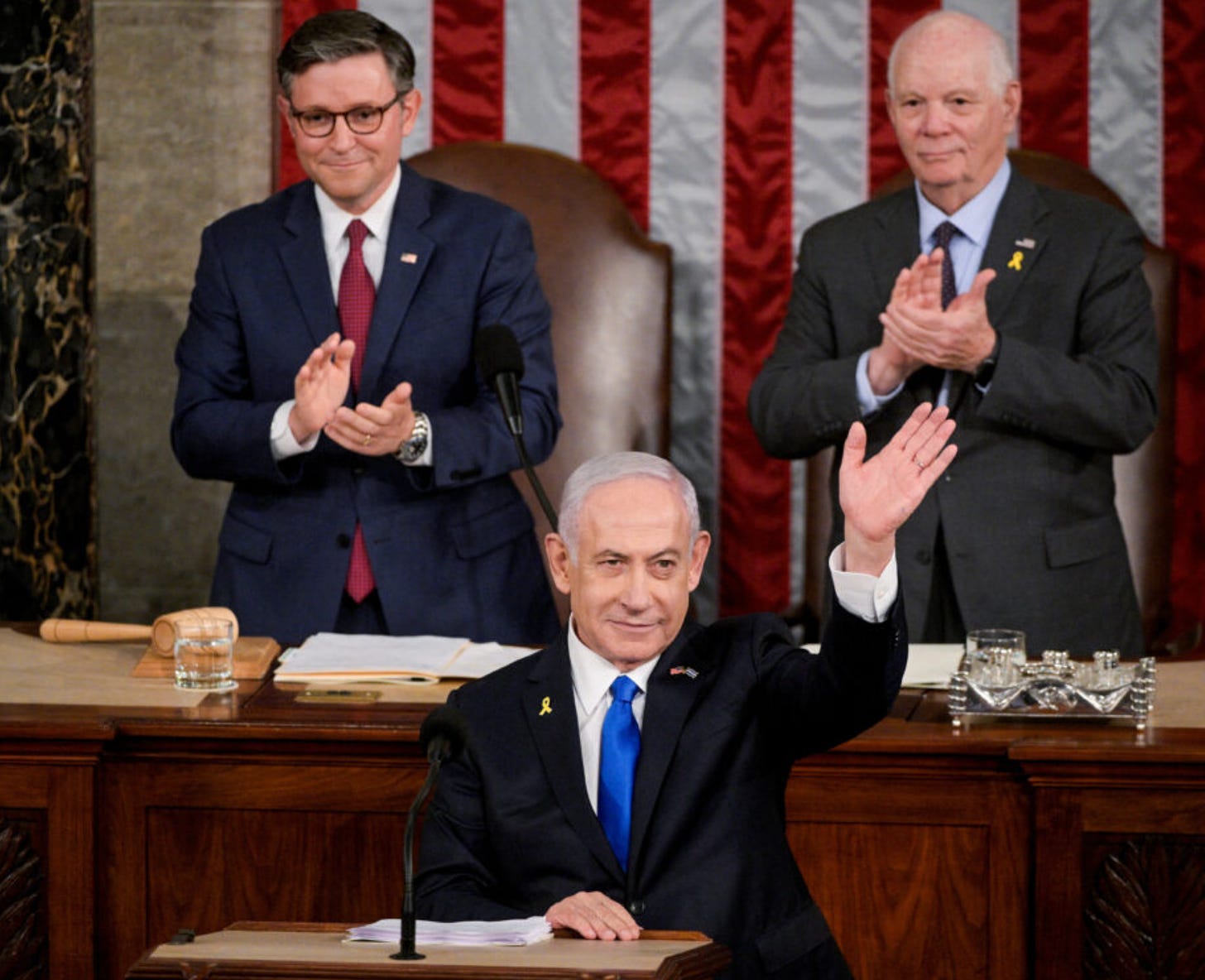
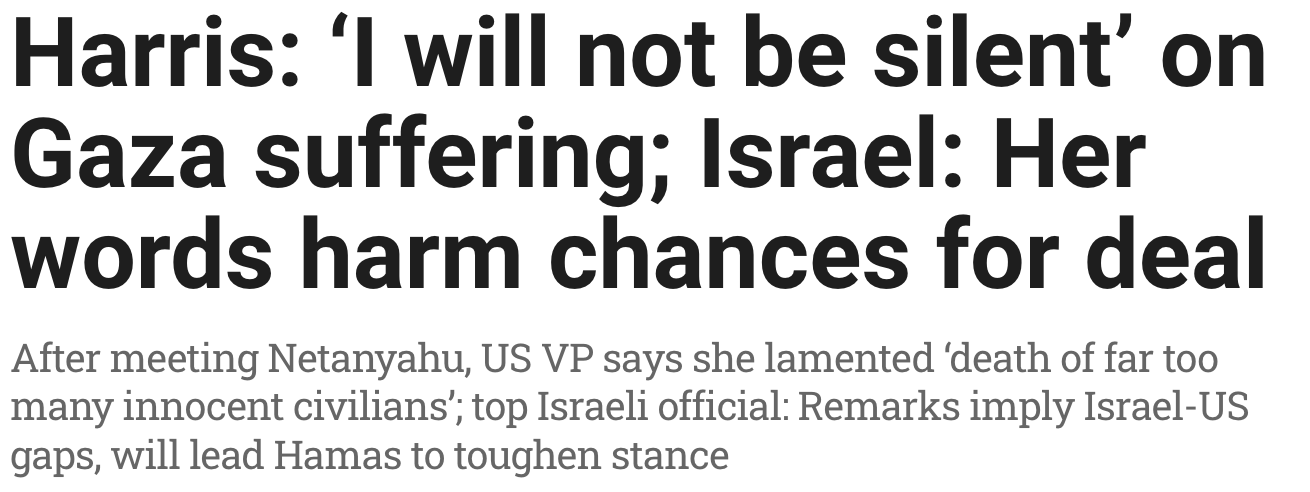
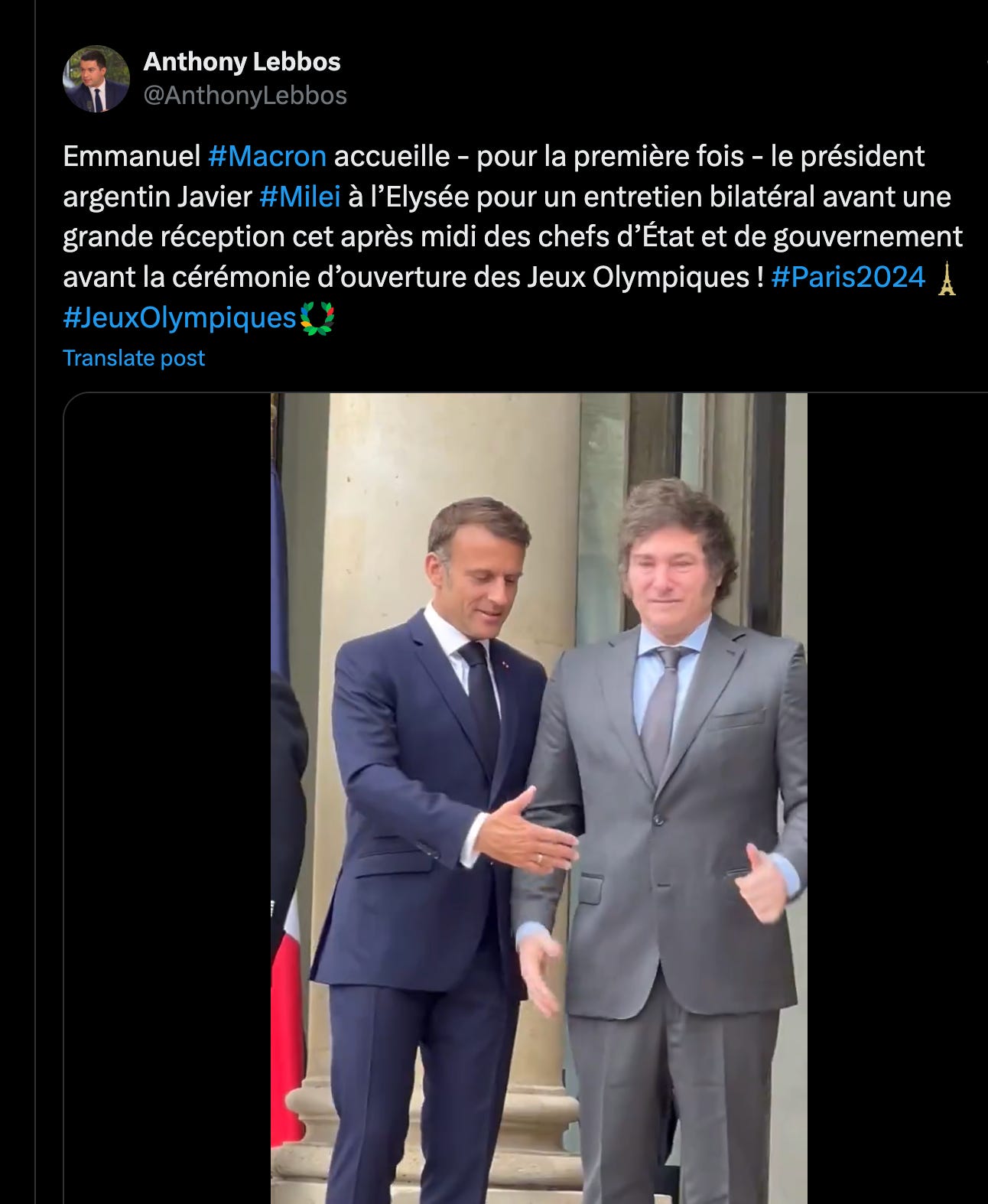
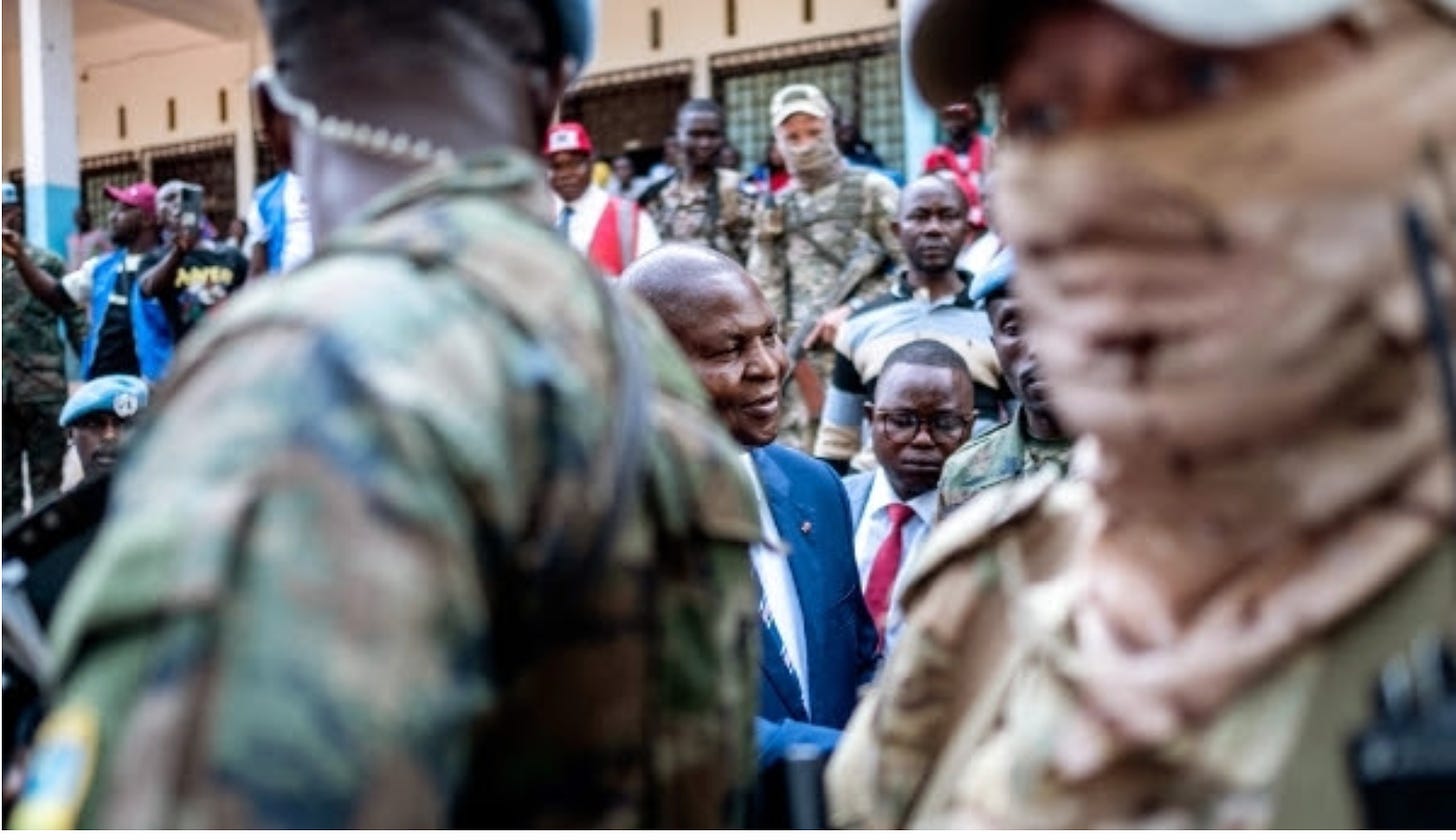
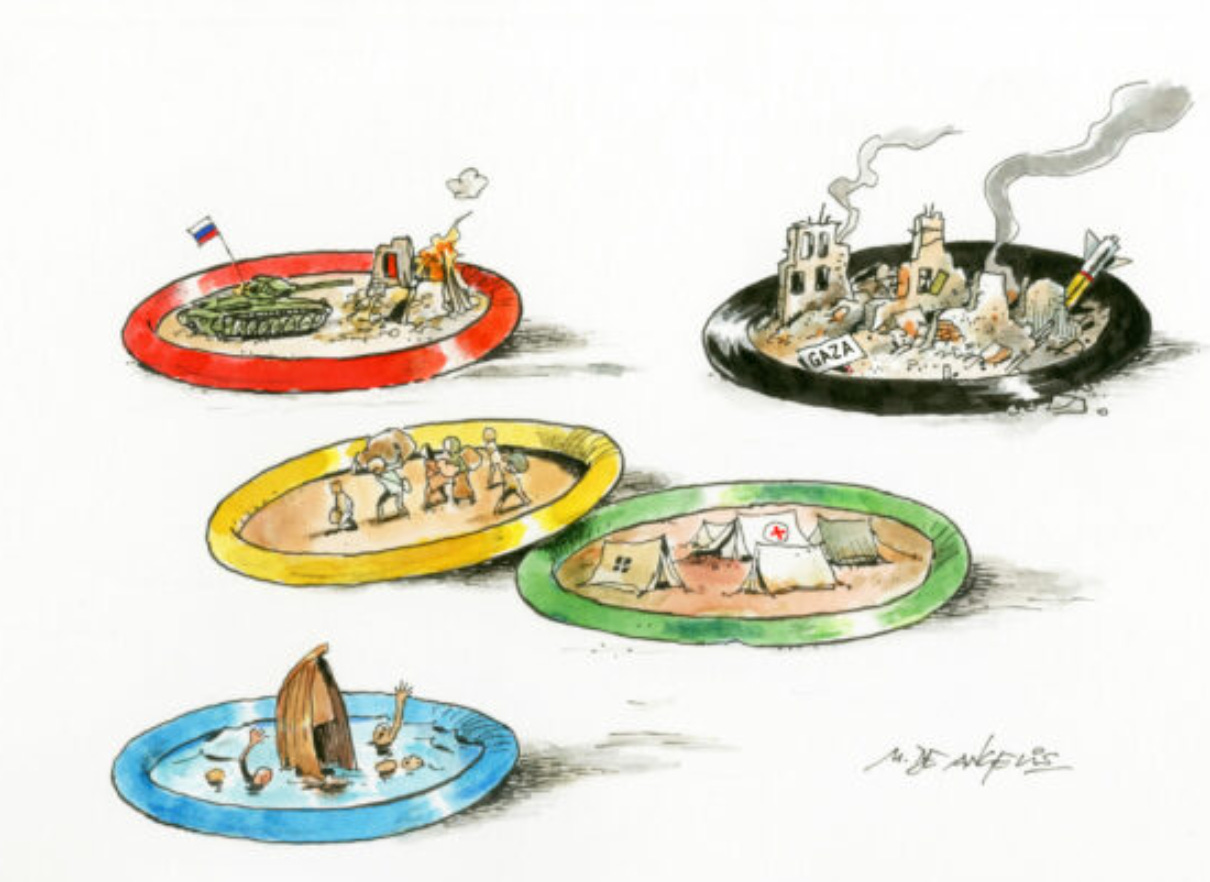


Once again, a terrific compilation, David. It gave me what would take a half a week to track down by hand!
There are so many funny or composite things about Opening Day in Paris (and its coverage) that they pop in, like Diego Rivera elements, or a Dalí layout. My first glimpse of the 'parade' was a TV shot of dancers gyrating against a sparkly theatrical prop, sort of mini-mountain, which seemed to be ruining the view of the arcades of Rue de Rivoli, which is impossible to see from the Seine. Then, it occurred to me that it's only 1 camera shot, no indication of 'from where'.
I suppose the 'news' of that now-famous Céna (Last Supper) montage with its Dadaist stand-ins came too late for you to comment on. (The non-French press agencies seem to not even have a picture of it!) It might make for interesting chit-chat on your new Unleashed Conversation. May it be successful!